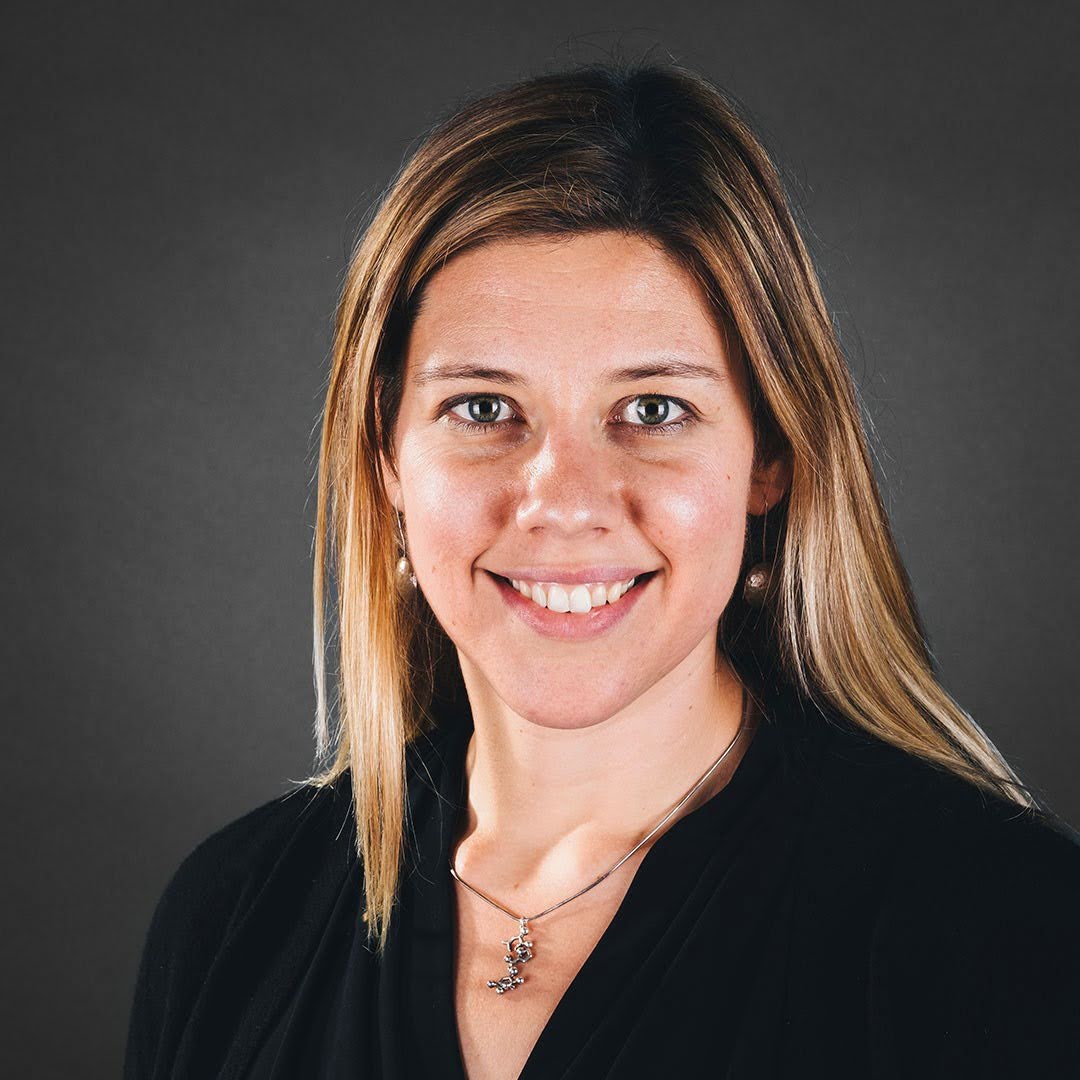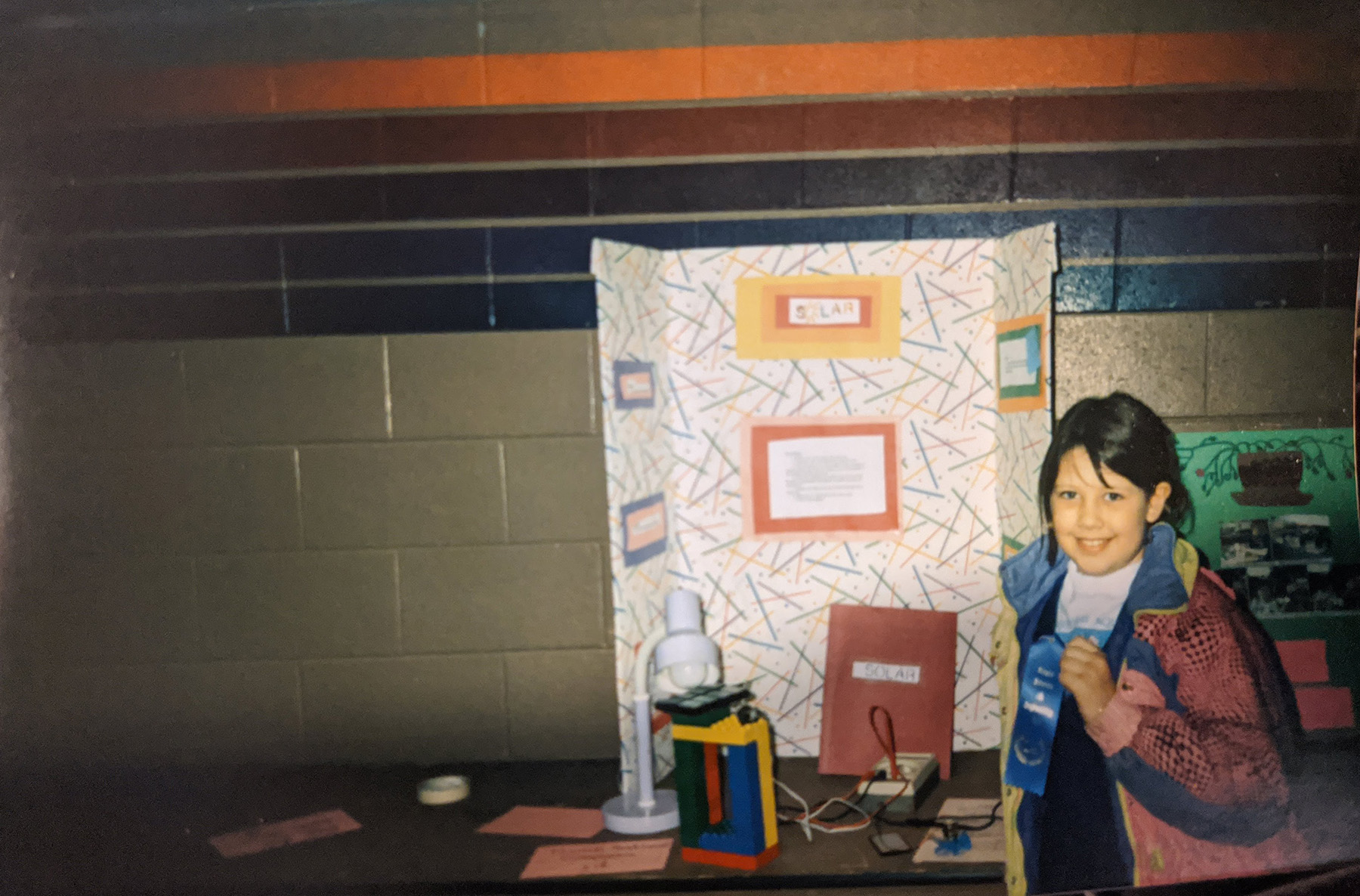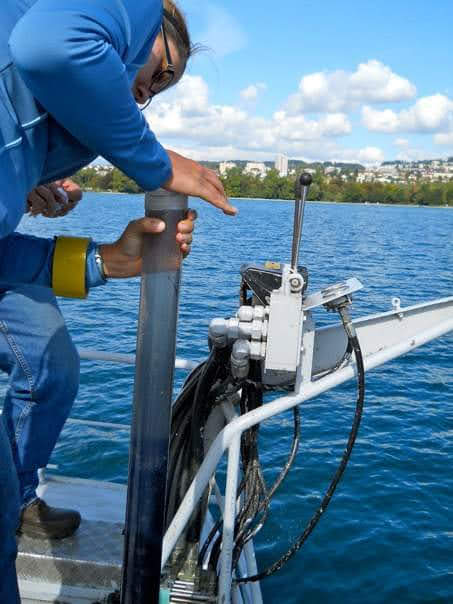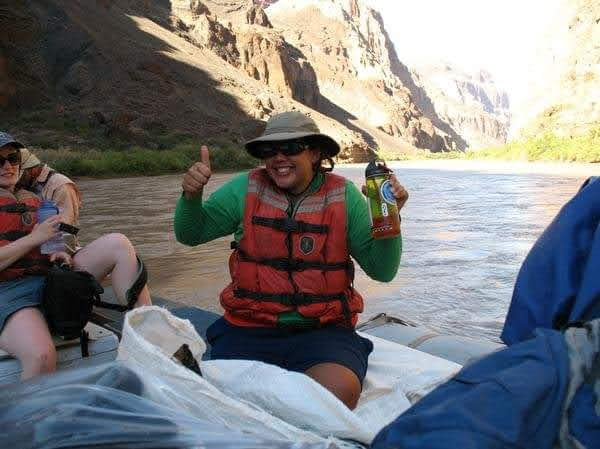From Wasilla to Amazon

Liz Dennett
Profession: Lead Solutions Architect, Amazon Web Services Energy Data Platform
Degrees:
- B.S. Geology/Earth Science, University of Alaska Anchorage
- M.S. Astrobiology/Geochemistry/Geomicrobiology, University of Wisconsin-Madison
- Ph.D Geomicrobiology/Astrobiology, University of Wisconsin-Madison
Liz Dennett works with big data for a big company – Amazon. It’s a high-profile job in a field that didn’t even exist when she was an undergrad at UAA. The Wasilla native shares with us how some of the small choices she made at UAA made a big difference in her career path.

Please tell me a little bit about yourself.

Originally, I am from Wasilla. Growing up, it was the kind of environment where you had to be somewhat scrappy. If your bike broke you couldn’t drive down to Target and pick up something to fix it. You had to really be creative about how you entertained yourself and how you lived your life. That sense of wanting to build, and create, and improve the system around me has kind of been in my DNA forever and ever.
The ongoing joke is that in high school I was voted most likely to get away with anything – not because I had malicious intent, but because I was always like, “Oh, there is a better way to do it! I’ll invent a better system.”
From [high school] I was a UA Scholar so I went to the University of Alaska Anchorage because I had no idea what I wanted to do with my life. I was planning on going to law school and working at a shiny high-powered job at an office somewhere.
[Once at UAA] I actually took the easiest science class they had, because I didn’t think I was good in science or good in math. In hindsight, I took AP Calculus when I was 15; I took all of my calculus when I was still in high school at a local community college; and I had gotten A’s in everything. But for some reason in my head I didn’t think I was good at science or math.
Do you think being a woman had anything to do with that feeling?
I know that seems really opaque, but if you look at the primary literature – if you’re giving both men and women a math test and you say on the math test “women have been shown to do as well as men” both genders will perform evenly. If you say on the test “men tend to outperform women” that will hold true. And so, I think absolutely my background played a role in that, but on levels I wasn’t even aware of.
Thank you for sharing that, please tell me more about your formal education.
So, I got to UAA and I take the easiest science class which was Geology 100 – rocks for jocks – and I fell in love with it. My dad was a geologist so I swore I would never do it, but I was captivated by the interdisciplinary nature of the science and how the chemistry I learned about overlapped with geology and physics. It taught me so much about how to systematically approach the world. I ended up getting my undergrad at UAA in geology and I did research on fecal coliform levels in Little Campbell Creek because I wanted to do something with microbiology and tie that to the geology, and this was the only project that had funding. So, I spent a summer looking at water and enumerating fecal coliform levels and tying that to other water chemistry properties. It was really fun, and that actually went on to be the basis of my grad school applications. Like, “Hey, I went and sampled creeks and looked at poop bacteria for a year and it was really cool and I liked it!”
It sounds like interdisciplinary work is of interest to you.

Yep. My Ph.D. project in particular is geology, chemistry, and microbiology. I am a geomicrobiologist with a strong affinity for interfacial biogeochemistry and water chemistry.
I ended up going to Wisconsin-Madison for grad school; first for a master’s then for a Ph.D. because they had an astrobiology program. I was funded by the NASA Astrobiology Institute looking at how life evolved on early Earth, and how that could be a proxy for life on places like Mars or Europa.
The farther I go in my career, the more that [interdisciplinary] background and diversity has turned into one of my super powers.
I think a lot of times people assume that they need to fit a certain mold or a certain genotype and that can definitely work, but I have seen much more power in just really giving yourself that broad foundation and being open to every opportunity that comes your way. Be it fecal coliform research, or be it a rafting trip down the Colorado river, or having to go to field camp when you don’t even like camping. All of those things tie together to just make you a nimble and agile human being.
Which I am guessing ties in your ability to be scrappy and innovative.
Bam! There you go! Yup! Now I work for the largest startup in the world.
These days I am a lot more of an engineer, but at my core I like to think that I am a lot more of a scientist. Both of those have very different thought processes. If you’re focused on solving problems, or on deductive logic… that STEM education component is really your ticket to unlocking the most opportunities you will have in the future.
Tell me more about your current position at Amazon Web Services?
I am a Senior Partner Solutions Architect. Essentially what I do is work with technology partners to build and launch cloud-based solutions that from today to five to ten years out.
It is the kind of job where every day is super different. I do a lot of deep dives with customers, like if you want to build a solution that can take rock data from a machine and have it looked at by someone anywhere in the world how do you get the data either from that machine to the cloud; how do you securely scale it; how do you map it; how do you do big data analytics. Whiteboarding like that, to helping them write papers and publishing, to giving lots of conference presentations, to helping with change management, to making sure that these ideas actually gain traction.
What is particularly fascinating is the job that I have now did not exist when I was at UAA 16 years ago, the cloud was really not even a thing yet.
I am so grateful to UAA because they provided a broad foundation that really allowed me to tackle so many challenges, and to have been able to compete head-to-head with the smartest and brightest people by having that really solid STEM core. I remember too, the year I graduated we had a capstone requirement which wasn’t in previous catalogs and the idea was that you would take a 400-level class of a different department just to get outside of your comfort zone. I didn’t understand it at the time, I was like, “this is ridiculous I don’t need to take an anthropology class or a women studies class, I’m a geologist this is what I do!” But being able to break down those silos and think about things interdisciplinarily is one of the key advantages to a STEM education.

Do you have any recommendations for students, to help them be more prepared for a career?
LD: Yes! Build your network. I know people say that all the time, but reach out to people who you admire or who have jobs that you might be interested in and just get a sense of what it’s like. There are lots of tips and techniques and ways you can do it using platforms like LinkedIn for introductions, but never be afraid of sending an email or an ask to get coffee out into the universe. Even if you never hear back you will sleep so much better at night knowing you tried, then being too scared to try.
Did you do a little bit of that sleuthing and networking yourself?
I am naturally very curious. And I am also very extroverted so any chance I got to connect with someone, I always tried to take advantage of that. I remember at UAA in particular there was an opportunity to present my research at, I think it was a state microbiology meeting, I did that.
The other thing is to get involved with as much stuff as possible in college. In UAA I was on concert board, I was with student government, I had leadership honors, I was in the honors program, I did everything. And I worked with Residence Life because it was really fun, but also those types of skillsets and that capacity for leadership is one of the key ways you can differentiate yourself later.
Having the leadership honors was one of the things that helped me first get internships even though I didn’t have the dominant expertise, but because I had a track record of leadership behavior – that is something that has been really advantageous in my career.
I’m curious about other challenges you might have faced growing up, being in school, or going throughout your professional career?
There are two big things that I want to talk about. The first is that by growing up in Alaska and by having a very different path than pretty much anyone around me today – that instilled with me this sense of hard work. I’m sure a lot of [Alaskan] students can relate to my upbringing where if we didn’t chop firewood we didn’t have heat for the winter, or if we didn’t can the salmon we weren’t going to have protein in the winter. That sense of really digging in, and working as hard as possible now to make life and the future easier – that is a superpower that Alaskans have and that has helped me overcome so many obstacles.
My first day of grad school they lined up all of the grad students around this conference table and pretty much the talk was “Hey, a bunch of you won’t survive. This is a very competitive program. You have [qualifications] you have [preliminaries]. You need to publish X number of papers to make it out.” And honestly it was terrifying. I was sitting at the table with people from Ivy League schools and from these private schools that I had never heard of who had done research that was insane, and here I was with my fecal coliform enumeration. But, once that talk was done I went to the library and I grabbed textbooks, and I printed out as many journal articles as I could find, and I studied. I studied harder than I had ever studied before, reading everything I could get my mind around. When some of my colleagues decided they didn’t want to study – they wanted to maybe go out or have fun – I sunk my teeth in. Just like in Alaska where you have to chop firewood during the summer, I pretty much did that my first few years of grad school and it provided enough of a baseline to help me be successful. Mentally it really helped with my own imposter syndrome - which is the second thing I want to talk about.

I had no idea what [impostor syndrome] was in undergrad or really until I got to grad school. I remember it was the end of my first or second semester and I was talking to one of my friends there – another grad student – like, “well this is great, but I really don’t deserve to be here” like, “when is this going to end, when are they going to find out that I am a giant fraud here”. And she confided in me, “oh my god I feel the same way!” We eventually went on to learn that that is called impostor syndrome and both of us in fact completely deserved to be here – and now she’s a professor! But that notion that there is a name for this feeling – like you don’t belong or that you’re not good enough, that was huge. Once you name something you can start to be mindful about associating feelings with it and recognizing strategies to overcome it. So that was really big too. And impostor syndrome is something personally that I struggle with and in fact the vast majority of successful people I know also struggle with it. So, instead of it being something that stops us, a lot of times I will seek out mentors who can help provide context and strategies for dealing with it.
If there was one thing that you could share with a student considering a STEM career or who is nervous about getting into STEM, what would you say?
I would say that it is okay to be scared, and in fact being scared or nervous that it is so far outside your comfort zone is a sign that you’re pushing yourself far enough. If you’re not uncertain and your career is not challenging you, you need to think a lot bigger.
To get yourself started with a STEM education, what you do is provide this very, very broad base that can help you to take advantage of any opportunity that comes your way.•
*******
Dennett invites all students to find her on LinkedIn and reach out to her if they have more specific questions or to help them in their own STEM career. She also creates some very interesting videos – check them out!
Interview by Courtney Breest, Alaska NSF EPSCoR. Click here for more Faces of STEM. All photos courtesy Liz Dennett.

